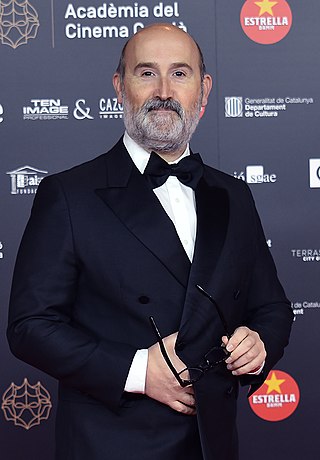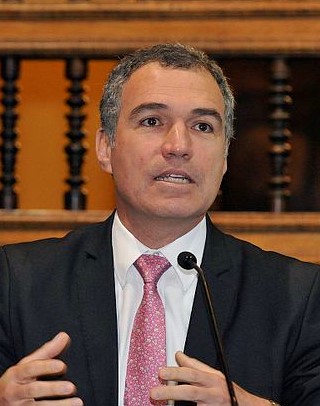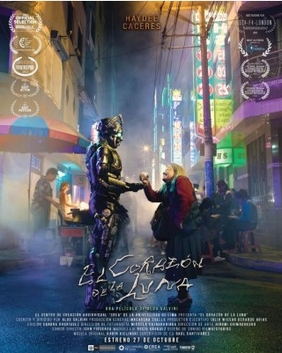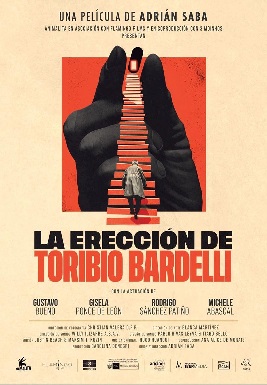
Luis Miguel Sánchez Cerro was a high-ranking Peruvian army officer who served as the 41st President of Peru, from 1931 to 1933 as well as Interim President of Peru, officially as the President of the Provisional Government Junta, from 1930 to 1931. On August 22, 1930, as a lieutenant-colonel, he overturned the eleven-year dictatorship of Augusto B. Leguía after a coup d'état in Arequipa.

Javier Cámara Rodríguez is a Spanish actor.

While the Peruvian film industry has not been nearly as prolific as that of some other Latin American countries, such as Mexico or Argentina, some Peruvian movies produced enjoyed regional success. Historically, the cinema of Peru began in Iquitos in 1932 by Antonio Wong Rengifo because of the rubber boom and the intense arrival of foreigners with technology to the city, and thus continued an extensive, unique filmography, with a different style than the films made in the capital, Lima.
Cinépolis is a Mexican and international movie theater chain. Its name means City of Cinema and its slogan is La Capital del Cine.
The cinema of Iquitos, also known as Amazonian cinema, is an important film development and one of the historic pioneering event of cinema of Peru. Due to the rubber boom and the arrival of foreigners, film interest began in the early 20th century, along with the evolution of cinema of the United States in Hollywood. Cinema in Iquitos had no established date of origin. The first film, however, was made in 1900. The first films were shown in the Casa de Fierro with an Edison machine, which reproduced the images using a carbide lamp and the constant movement of the operator. Iquitos is mentioned as a metonym of cinema in the Peruvian Amazon.

Enrique de la Riva-Agüero y Looz Corswaren was a Peruvian lawyer, diplomat and politician. He was a member of the Civilista Party. He was born in Lima, Peru. He graduated from the National University of San Marcos and served on its faculty. He was a member of the Chamber of Deputies of Peru and Senate of Peru. He served three times as foreign minister of Peru and twice as Prime Minister of Peru. He died in Rome, Italy.

Francisco Tudela y Varela was a French-born Peruvian diplomat, lawyer and politician. He was born in Paris, France. He graduated from the National University of San Marcos and served on its faculty. He was a member of the Civilista Party. He was Minister of Finance and foreign minister in the Government of Peru. He was 68th Prime Minister of Peru under President José Pardo y Barreda. He served as ambassador of Peru to Spain and the United States (1918–1919), and later to the Netherlands (1936). He served as President of the Chamber of Deputies (1915–1916). He served as mayor of Lima.

Salvador Alejandro Jorge del Solar Labarthe is a Peruvian actor, director and politician. He served as Prime Minister of Peru from March to September 2019, in President Martín Vizcarra's administration.

Moon Heart is a 2021 Peruvian science fiction drama film written and directed by Aldo Salvini and starring Haydeé Cáceres. The film tells the story of M, an old homeless woman who one day sees a mechanical angel that will change her life. The film was selected by the Ministry of Culture as the Peruvian entry in the Best International Film at the 95th Academy Awards.

Viejos amigos is a 2014 Peruvian comedy film directed by Fernando Villarán Luján and written by Villarán and Gonzalo Ladines. It stars Ricardo Blume, Carlos Gassols and Enrique Victoria, and antagonizes Teddy Guzmán.

Willaq Pirqa, the Cinema of My Village is a 2022 Peruvian-Bolivian Quechua-language comedy-drama film directed by César Galindo and written by Galindo, Augusto Cabada and Gastón Vizcarra. It tells the story of Sistu, a 13-year-old boy who lives in a community in Cusco, he discovers the magic of cinema, but the language barrier prevents the villagers from enjoying the movies.

The Colón Theatre is a historical building and former theatre located next to the San Martín Plaza, part of the historic centre of Lima. The theater belonged to Teatros y Cinemas Ltda. Its construction began in 1911, being inaugurated on January 18, 1914.

Deliciosa fruta seca is a 2017 Peruvian drama film written and directed by Ana Caridad Sanchez in her directorial debut. Starring Claudia Dammert. The film is proposed as "a tribute to the marinera, to women and to the conquest of freedom."

The Erection of Toribio Bardelli is a 2023 black tragicomedy film written and directed by Adrián Saba. An international co-production between Peru and Brazil, the film stars Gustavo Bueno, with Gisela Ponce de León, Rodrigo Sánchez Patiño, Michele Abascal and Lucélia Santos. The film was selected as the Peruvian entry for the Best International Feature Film at the 96th Academy Awards.

Tayta Shanti is a 2023 Peruvian drama film directed, written and edited by Hans Matos Camac. It is about Angie and her cousin Marcelo who must face their own identity: she struggling to accept her ethnicity and he struggling to accept his true sexuality.
Walter Weberhofer Quintana was a Peruvian architect of the 20th century.

Arenales Shopping Centre, also known as Arenales Plaza and as Arenitas, is a shopping centre in Lince District, Lima, Peru. It takes its name from the avenue where the building is located on its 17th block. It is known as the "heart of otaku and gamer culture" in the city.
















